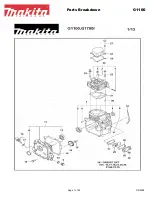
Introduction to Digital TV Transmission Technique
1–6
MTD200 MPEG Test Decoder User Manual
The transport stream as a multiplex stream has to receive data from different
elementary streams. The beginning of a new packet is marked by a sync byte
0x47. The packets of a transport stream have a fixed length of 188 bytes. The
value 0x47 is not exclusively reserved for the beginning of a packet. Thus, this
value does not always indicate a packet start.
To ensure stable synchronization, however, the repetitive occurrence of a sync
byte at 188-byte intervals must be checked. The hysteresis parameters define
how often the value 0x47 must occur at 188-byte intervals for the packet
synchronization to be considered locked or how often the sync byte must be
missing or the wrong for the packet synchronization to be declared lost.
The sync byte interval can also be 204 bytes (188 + 16 bytes). In this case, the
last 16 bytes originate from the channel coding (Reed-Solomon error protection).
Channel decoding has already taken place at the transport stream level so that the
16 bytes at the end of each packet do not carry any useful information. Only the
clock conversion from 204 to 188 bytes per packet duration has not been
performed.
A header with a length of four bytes precedes each transport stream packet. The
first byte of the header is the sync byte, as described above. If not all the bit
errors caused by transmission can be eliminated during channel decoding, the
Transport Error Indicator is set in the header of the packet concerned.
Critical information for identifying a packet is the PID (Packet IDentification).
The PID is a field of 13 bits. It can thus have 8196 different values. A PID is
assigned to each substream such as a video or audio stream (not to a program).
Some PID values are fixed, such as value 0x000 for the PAT (see Contents of the
Transport Stream on page 1–6), value 0x0001 for the CAT (see Descrambling
on page 1–8), and value 0x1FFF for the so-called zero packets that do not
contain useful data but only dummy bytes.
The transport stream normally contains several programs consisting of several
elementary streams. The contents of the transport stream is described in the
Program Specific Information (PSI). Each transport stream contains a Program
Association Table (PAT) as well as one or several Program Map Tables (PMTs).
The PAT is contained in the transport stream packets with the PID 0x0000. It
refers to all the programs contained in the transport stream. The PAT indicates
the program number and the corresponding PID for the Program Map
Table (PMT).
The elementary streams (vision, sound, data) that belong to the individual
programs are described in a PMT. A PMT consists of one or several sections,
each describing a program.
Transport Stream
Synchronization and
Packet Identification
Contents of the Transport
Stream
Summary of Contents for MTD200
Page 1: ...User Manual MTD200 MPEG Test Decoder 070 9951 00...
Page 4: ......
Page 15: ......
Page 29: ...Introduction to Digital TV Transmission Technique 1 14 MTD200 MPEG Test Decoder User Manual...
Page 30: ......
Page 51: ......
Page 62: ......
Page 97: ......
Page 167: ...Remote Control 5 70 MTD200 MPEG Test Decoder User Manual...
Page 168: ......
Page 174: ...Maintenance and Checking 6 6 MTD200 MPEG Test Decoder User Manual...
Page 175: ......
Page 194: ......
Page 204: ...Glossary Glossary 10 MTD200 MPEG Test Decoder User Manual...
Page 205: ......
Page 209: ...Index Index 4 MTD200 MPEG Test Decoder User Manual...
Page 210: ......
Page 211: ......
















































